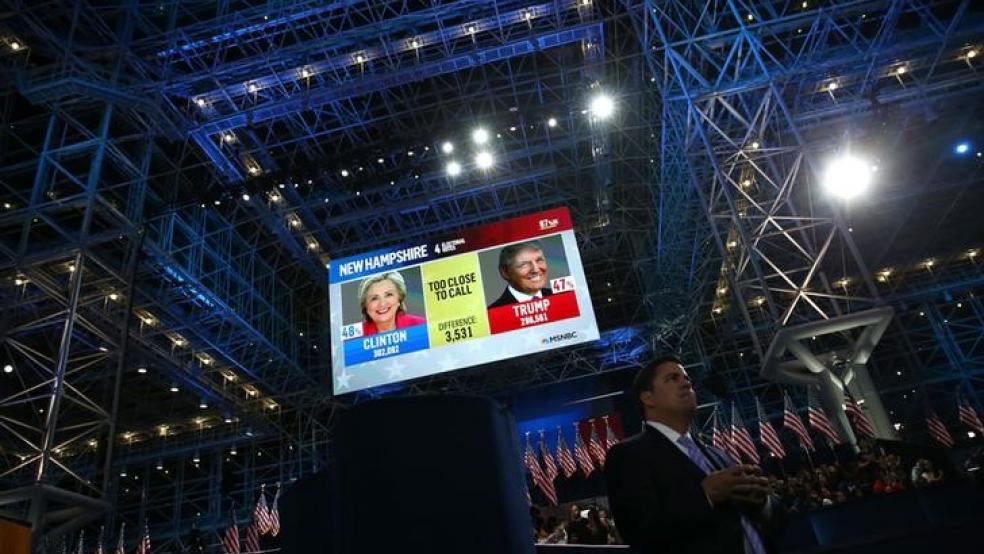You can’t take a hand grenade back after you’ve thrown it, but FBI Director James Comey gave it a try on Sunday. In an unexpected letter to members of Congress, Comey said that his agents had completed their investigation into recently uncovered Hillary Clinton emails, and that the review did not change the agency’s earlier decision to not recommend charges be brought against the Democratic presidential nominee.
It was a little more than a week ago that Comey upended the presidential race by informing members of Congress that thousands of emails had been discovered on a laptop belonging to former Rep. Anthony Weiner, the estranged husband of Clinton aide Huma Abedin. In announcing the existence of the emails, which his agency had not yet reviewed, Comey appeared to break with Justice Department protocol, which directs that investigators and prosecutors not release sensitive information immediately before an election.
Related: Has Trump Put Michigan and Minnesota in Play? Probably Not
It’s unclear just how much damage the original Comey letter did to Clinton. The presidential race appeared to be tightening for a number of reasons even prior to Comey’s announcement. There is little doubt, though, that the introduction of new uncertainty about Clinton’s legal status in the final two weeks of the presidential race was a serious drag on her candidacy just as remaining undecided voters were seriously trying to make up their minds.
Many of those who used the new information as part of their decision-making process may have already cast a vote based on it. Economist David Rothschild, who analyzes polling and elections data, estimates that because early voting is under way, as many as one-third of all votes in the election were cast in the nine days following Comey’s first letter.
The renewed investigation raised questions about whether the new emails might contain evidence of criminal wrongdoing by Clinton or her staff, and led to a barrage of leaks from the FBI that included details about what was said to be an ongoing investigation into the Clinton Foundation.
Many of the stories that grew out of the furor about the new trove of emails — particularly the claim that an indictment related to the Clinton Foundation was imminent — turned out to be false. That didn’t stop Republican nominee Donald Trump and his surrogates from declaring Clinton preemptively guilty and promising that criminal charges were on the way. The GOP nominee was still doing so as late as Sunday afternoon, at a rally in Minnesota.
Related: Gary Johnson’s Fading Run Could Be the Margin of Victory for Clinton or Trump
Clinton campaign spokesman Brian Fallon, shortly after the new letter was released, tweeted, “We were always confident nothing would cause the July decision to be revisited. Now Director Comey has confirmed it.”
Clinton herself was plainly furious with Comey, as were President Obama and senior Democrats across the country. Even some Republican lawmakers said they considered the move improper, as did a number of former Attorneys General and senior Justice Department figures from both parties.
The second letter, made public by House Oversight and Investigations Committee Chairman Jason Chaffetz (R-UT), said that since Comey’s first letter to Congress, “the FBI investigative team has been working around the clock to process and review a large volume of emails...During that process we reviewed all of the communications that were to or from Hillary Clinton while she was secretary of state.”
He continued, “Based on our review, we have not changed our conclusions, which we expressed in July with respect to Hillary Clinton.”
Related: Trump's Rise in the Polls Is Changing the Market’s Risk Calculus
Comey was referring to his controversial decision to hold a press conference to announce the FBI’s decision not to recommend an indictment. The unusual public discussion of an investigation included what many saw as unwarranted commentary from Comey about Clinton’s behavior. He said, for example, that she and her staff had been “extremely careless in their handling of very sensitive, highly classified information.”
Under normal circumstances, the FBI wouldn’t have been in the position of deciding whether or not to bring an indictment, as that is the job of prosecutors at the Justice Department. However, Attorney General Loretta Lynch effectively recused herself from the decision-making process after an ill-advised meeting between her and former president Bill Clinton while the investigation was ongoing raised questions about her impartiality.
The latest announcement is yet another turning point in an election that has been more dramatic than most. On its face, this most recent development is good news for Clinton. While they are an imperfect measure, prediction markets, which allow people to bet on the outcome of the presidential election, had already shifted their odds to reflect what they read as the greater likelihood of a Clinton victory.





